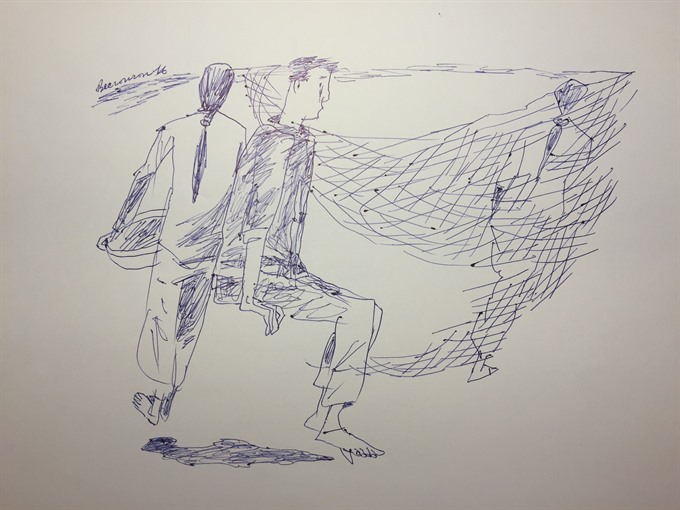

A short story by Dĩ Lang
 |
by Dĩ Lang
Tư deliberately put a flowerpot close to the veranda wall then slowly walked to the front courtyard. In the dim light of late afternoon, he looked a bit smaller. With his hands, calloused due to his hard life, he scooped up some cool rainwater from a jar for a bath. Before going to the fields, he took a torn net to cast into the estuary of the Nhỏ River in the hope that he might catch a few fish for dinner. If he was lucky and caught something, he would have a good meal. If not, his frugal dinner would consist of boiled vegetables and fish sauce. Such was life in the countryside.
“Dad, may I set the table?” Nhiên, his beloved daughter, asked him.
“When did you get home?”
“Early this afternoon, Dad. Who did you work for today?”
“Uncle Bẩy. He asked me to improve some of his field dams. He’s worried they might break and the water will drain away.”
She placed a tray of food on a wooden plank near the door. That evening’s dinner featured, aside from the usual boiled vegetables and fish sauce, a large bowl of sour mullet broth that she had bought at the market on the way home.
“How long are you staying here?”
“Only a week, Dad.”
He found the food wonderfully delicious. Throughout dinner, their laughter warmed the cold air in the house.
After the meal, she mended her father’s damaged net and a few torn pieces of clothing, overused over long years. The quiet house soon resounded with the music of crickets. As she worked, he drank black tea and smoked several hand-rolled cigarettes. The smoke curling round and round dragged him into the past.
“How’s our paddy harvest going this year, Dad?” Nhiên asked him softly.
“Not too bad, my beloved child. Probably enough to cover your school fees next year.”
“Dad, I can manage with part-time jobs. You’d better keep it for a rainy day.”
“Hmm you might need more in the future.”
“Far from it, Daddy! Don’t worry about me!”
“Come what may, I’ll have to save some for your unexpected expenses. Borrowing money can be tricky.”
“It doesn’t matter. How’s your bad shoulder feeling?” she shifted the subject off money, worried her father might turn depressed.
“Sometimes it’s painful,” he replied with a cigarette between his lips.
“You’d better look after it, Dad. You shouldn’t be labouring for other people anymore.”
The sun went down and darkness fell gradually. As well as the waves, traders could be heard chatting after a long day working on the river.
Tư remained seated, smoking and looking at the river wharf. His mind drifted off to the distant past. Before long he was vividly reminiscing.
* * *
Several expanses of cajeput trees grew tall despite the enemy’s long siege. Surprisingly, the plants stood firm after being pounded by air strikes and protected the regional militia with their canopies.
One day, while Tư was lost in thought, he heard some of the underground militiamen’s secret signals.
“Brother Tư, this place is too dangerous for our secret forces,” said the militiaman who emerged from a dense cajeput cluster. He stared at the damaged woods.
“We can’t yield this riverside to the enemy,” Tư said firmly. “This riverside is of paramount importance for our next wave of offensives. The enemy’s relief and provision ships will pass by here. We have to abide by our orders.”
“We’ve stayed here too long already!” exclaimed the young militiaman.
“We can’t abandon the riverside at any cost,” Tư reaffirmed.
While they were arguing, Tư saw a figure appearing at the estuary. Silently, he inched his way along the reed canopy overhead towards the landing. It was a 20-year-old militiawoman.
“What are you doing here?” he asked her. “Don’t you know how dangerous it is here?” he asked.
She was startled at first then quickly became at ease.
“Dear comrade, I’m Bình of the self-defence militia on the other side of the Nhỏ River,” she whispered.
“My husband Hòa belongs to this unit. I was told that he’s staying here before an important fight, so I came here to meet him,” she said.
“Unfortunately, he was dispatched to the regional forces yesterday morning for a pitched battle. Follow me, I’ll take you somewhere safe,” Tư urged her.
Tư had hardly finished speaking when an enemy plane flew overhead. They both hid under a cluster of reeds amid the bombs which rained down continuously together with salvoes of machine-gun fire. Tư quickly pushed Bình down and covered her body with his. Minutes later, when the attack was over, they waded towards a stretch of cajeputs close to the estuary of the Nhỏ River. Suddenly, the jet fighter returned with a series of heavy bombardments. Again he protected her with his body as she blacked out.
She swiftly regained consciousness. Looking around, she saw him collapsing with a loud cry. His arm was bleeding. Shrapnel had hit his shoulder. With great effort she dragged him aground, till they were lying under a canopy of stars.
A week later, his health had improved noticeably. Yet, time and again, the wound stung him.
* * *
Tư learned that Binh had married Hòa, one of his fellow militiamen, a month ago. Soon after the wedding, Hòa was ordered to return to his former unit. He was then dispatched to regional forces in preparation for a general offensive in the spring. Despite the danger Bình had gone to the wharf to tell Hoa that she was pregnant. Hoa had left the day before she arrived and met Tư. She stayed in a safe location near the wharf from then on, awaiting her lover’s return.
News of victories came to her, but nothing about her husband. Tư returned home and rigged up a temporary shed for her to stay pending her delivery. Evening after evening, Bình went to the wharf hoping for a letter from him, or at least some news.
“Don’t be so anxious, Bình. He’ll come back some day,” he assuaged her sincerely.
“Would he give up on us for good, Brother Tư?”
“No, never! He must be busy on the frontline, that’s all.”
“We won the war half a year ago,” she remarked, stooping down and touching her belly. “There’s a dear, my little thing. We’ll wait for his homecoming,” she whispered. The thickening twilight mirrored her growing depression.
Tư was upset when he saw her eyes brimming with tears. His wound felt painful again. He craved for a warm hand on his shoulder.
Soon her baby saw the light.
* * *
Sometimes, the little girl’s slight lisps made his heart warm when he came back from the fields. To his amazement, one afternoon, upon arrving home he could hear the baby’s cries, but Bình was nowhere to be seen. She had left a note, “Forgive me, my dear Tư! I humbly beg you to show your mercy: take care of Nhiên, my poor little child, instead of me. I can’t look after her.” Reading the letter, Tư was stunned. The angrier he felt at Binh the more pity he took on her.
Since then, he had been waiting for her return. Every evening, he took the child to the wooden plank on the veranda. It was there he stared at the wharf near the estuary of the Nhỏ River and waited and waited.
* * *
He snapped out of his daydream when a warm hand touched his shoulder.
“Dad, it’s late. You’d better go to bed soon. Mum won’t come home tonight,” Nhiên told him.
Tư turned round, saying nothing. The cigarette between his fingers went out unnoticed. In his heart of hearts, he saw Nhiên as his own child.
“You go to bed first, my dear daughter. I’ll go to bed when I finish this tea,” he said to her in a kind and warm voice.
Nhiên went straight to her bedroom. She hung his mosquito net over the sofa, ready for him to sleep under. Outside, the fog came down thicker and thicker. He hoped against hope that someday Bình would come back to her child. Ironically, Bình had waited for her husband for a long time in despair. Now it was Tư’s turn to wait, but for a strange woman, not his wife, with little hope . He gave a deep sigh of despair.
Nhiên slept soundly, she always slept well for some reason.
In the night sky, millions of stars shone over the wharf.
Translated by Văn Minh




